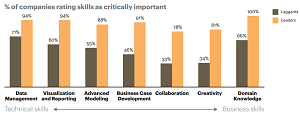News
New Surveys Show Big Data Skills Shortage, Low Adoption Rate
- By David Ramel
- December 11, 2015
Two separate studies recently confirmed that the Big Data skills shortage is still hampering enterprises, most of which have yet to put the technology to use.
Though it would seem the persistent, much-publicized skills shortage would have been alleviated by the explosion of new academic, commercial and corporate training initiatives, that doesn't seem to be the case, according to a study titled "Answering the Digital and Analytics Talent Gap: The New 'Trilinguals'" by A.T. Kearney.
Trilinguals refers to the new type of worker being sought by organizations for their Big Data implementations, who need skills in three areas: analytic modeling, technology and business.
"Capturing these types of knowledge workers has proven complex and difficult for many companies, especially those trying to play catch-up," A.T. Kearney said. "The supply of truly top talent -- those with the right combination of business and technical skills -- is well below demand, and competition is driving up prices." That might seem surprising, considering this refrain has been repeated for years now.
A.T. Kearney acknowledged the increase in academic courses to teach Big Data skills, but said that hasn't had much effect yet. "While colleges and universities are fast incorporating analytics programs and degrees, nearly 60 percent of respondents say that the talent coming out of these universities is insufficiently prepared," the firm said.
 [Click on image for larger view.]
Needed Skills Reported by Big Data 'Leaders' and 'Laggards' (source: A.T. Kearney)
[Click on image for larger view.]
Needed Skills Reported by Big Data 'Leaders' and 'Laggards' (source: A.T. Kearney)
Part of the problem is those trilingual skills needed. "A computer science major will have great programming skills and an information management major will have deep technology knowledge, but holders of both degrees will need to independently supplement their skill sets (for example, with business courses or experience within key business functions) to become truly trilingual," the survey said.
While there's no direct cause-and-effect linkage, the A.T. Kearney report would seem to support the conclusion of another new study that shows a persistent low adoption rate of Big Data technologies in the enterprise.
That report, "Big Data Analytics Market Study," was published a couple weeks ago by Dresner Advisory Services LLC. While it costs $595 to read, a promotional teaser indicates few companies have yet to hop onto the Big Data bandwagon.
"According to the study, current adoption is low with only 17 percent of respondents actively using Big Data in their organization today and just under 50 percent indicating they may adopt Big Data in the future," the company said. "Big Data analytics is ranked in the bottom third of 25 strategic business intelligence (BI) initiatives currently under study in 2015."
That jives with a similar conclusion by research firm Gartner Inc., which in May published a report titled "Survey Analysis: Hadoop Adoption Drivers and Challenges." In it, Gartner said, "Despite substantial hype and reported successes for early adopters, over half of respondents (54 percent) report no plans to invest at this time. Additionally, only 18 percent have plans to invest in Hadoop over the next two years."
To acquire the talent needed to increase the level of Big Data adoption, A.T. Kearney advises a multi-pronged approach that should be customized for individual organizational needs. Suggested strategies include: building a unique digital and analytics brand; using cross-disciplinary teams to embed analytics throughout the organization; building industry-university partnerships; and embracing rotational programs that move company talent throughout different silos.
"There is no one-size-fits-all strategy," A.T. Kearney said. "Every organization will have its own needs to pursue both near and long term, and understanding those needs will help determine what skills are needed. A good strategy will determine early where there are already good pockets of expertise, where more talent is needed, and where talent could be better used."
About the Author
David Ramel is an editor and writer at Converge 360.